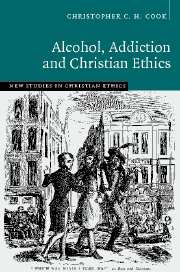Book contents
- Frontmatter
- Contents
- General editor's preface
- Preface
- 1 Alcohol, addiction and Christian ethics: introduction
- 2 An addiction in context: the use, misuse and harmful use of alcohol
- 3 Drunkenness as vice in the New Testament
- 4 Drunkenness as intemperance: Augustine, Aquinas, Luther and Whitefield
- 5 Temperance redefined: the nineteenth-century temperance movement
- 6 Addiction as sin and syndrome: the divided self
- 7 Alcohol, addiction and Christian ethics
- 8 Conclusions
- Bibliography
- Index of Bible references
- Index of names and subjects
4 - Drunkenness as intemperance: Augustine, Aquinas, Luther and Whitefield
Published online by Cambridge University Press: 22 September 2009
- Frontmatter
- Contents
- General editor's preface
- Preface
- 1 Alcohol, addiction and Christian ethics: introduction
- 2 An addiction in context: the use, misuse and harmful use of alcohol
- 3 Drunkenness as vice in the New Testament
- 4 Drunkenness as intemperance: Augustine, Aquinas, Luther and Whitefield
- 5 Temperance redefined: the nineteenth-century temperance movement
- 6 Addiction as sin and syndrome: the divided self
- 7 Alcohol, addiction and Christian ethics
- 8 Conclusions
- Bibliography
- Index of Bible references
- Index of names and subjects
Summary
The history of the Christian ethics of alcohol use and misuse is instructive as an example of the ways in which Christians with various experiences and theological positions may variously argue from the premises of scripture, tradition and reason in order to reach their ethical conclusions. In respect of alcohol, at least up until the nineteenth century, these ethical conclusions were actually remarkably uniform. All agreed that drunkenness was a sin. Insofar as moderate drinking was generally understood as good, or at least morally neutral, drunkenness was generally conceived of as a sin of intemperance. However, these conclusions were reached in various ways, and the ethical analysis of individual cases was not always as consistent as the overall uniformity might promise. The history of Christian ethical discourse on drunkenness is thus important to understanding both the context and the analysis of contemporary Christian ethics in this field.
In this chapter, a review of the history of the Christian ethics of drunkenness will be limited to post-New Testament works published prior to the nineteenth century. In the nineteenth century the debate took a new turn, and this deserves more detailed and separate analysis, which will be undertaken in the following chapter.
The task to be undertaken in the present chapter will be attempted by means of a focus on the works of Augustine of Hippo (354–430), Thomas Aquinas (c. 1225–1274), Martin Luther (1483–1546) and George Whitefield (1714–1770).
- Type
- Chapter
- Information
- Alcohol, Addiction and Christian Ethics , pp. 52 - 76Publisher: Cambridge University PressPrint publication year: 2006



